theartsdesk Debate: The Art of Performance | reviews, news & interviews
theartsdesk Debate: The Art of Performance
theartsdesk Debate: The Art of Performance
Actor, dancer, singer, instrumentalist compare the challenges of performing
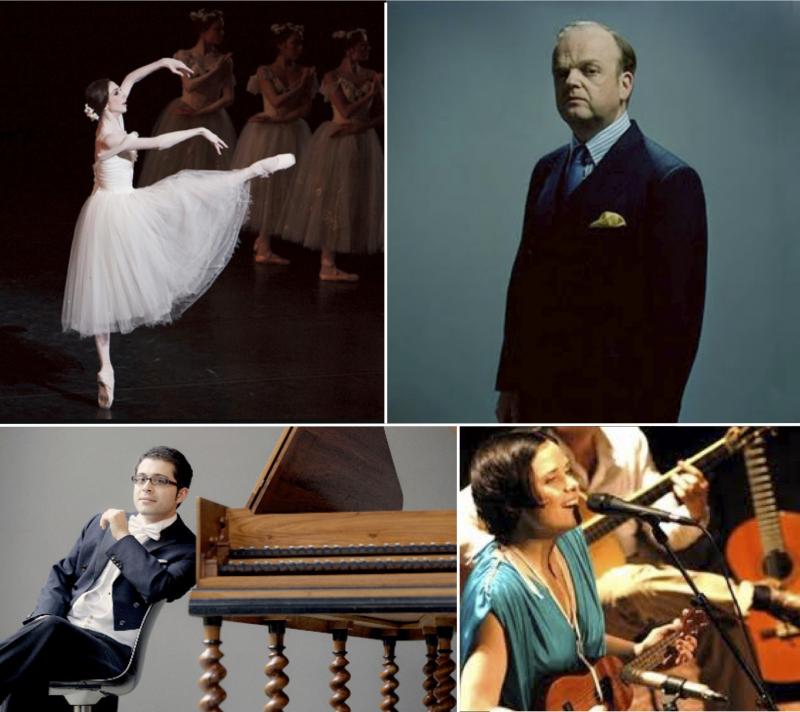
To celebrate theartsdesk's second birthday on Friday, we held a panel discussion on The Art of Performance at Kings Place, London, in the Kings Place Festival.
JOE MUGGS (theartsdesk): Welcome, ladies and gentlemen, to what will be the first of many live, streamed events from theartsdesk. This is a celebration of the second birthday of theartsdesk website, which is the first ever professional critics' website in Britain, possibly the world. We’re very happy to welcome a distinguished panel of guests from a variety of art forms who’ll be talking about their experiences on the art of performance. Let me introduce them to you.
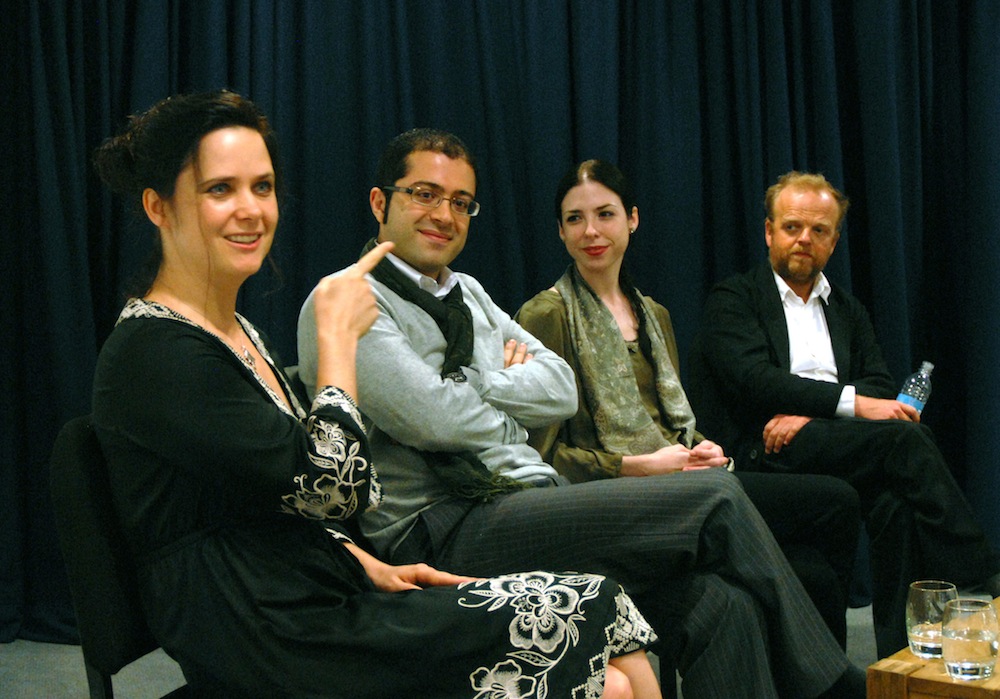
Mara Carlyle is a singer, songwriter, arranger, multi-instrumentalist… and ukulelist. She has after many years of wrangling just brought out her second album, Floreat, which is gaining many plaudits and has been hailed by some critics as a masterpiece. She’s worked with a variety of different producers and writers in classical music as well as electronic music, and has experienced both live and recorded performance.
Mahan Esfahani is a harpsichordist who has not perhaps come from the natural home of the instrument, being born in Iran. He’s a BBC New Generation artist, he has played at the BBC Proms and the Wigmore Hall, and has brought the harpsichord to a new audience with his approach to his instrument. Classic FM magazine have called him a “hot property” and he's artist-in-residence at Oxford University's New College.
Toby Jones is a star of stage and screen, starring in the eagerly anticipated film Tinker, Tailor, Soldier, Spy opening next week. He was Truman Capote in the film Infamous, starred at the National Theatre and won an Olivier Award for his role in The Play Wot I Wrote, and - very special to me - has been a Dream Lord in Doctor Who. So he’s done everything from performing live to 1,000 people and the close-up technique of TV and film.
Bridgett Zehr is the English National Ballet principal ballerina…. I don’t think I’ve ever sat next to a principal ballerina before, I definitely feel like I’m coming up in the world. [Laughter] Bridgett has just joined the British company from the National Ballet of Canada. She’s danced the leading ballerina roles in all the great classics, from The Sleeping Beauty to Juliet. She has donned sequins and a stetson in the ballet Western Symphony, and she was born in Florida - so she has a remarkable overview of arenas and sawdust as well as of the regal glamour of the ballet stage.
First of all, could I ask you each to tell us about a performer, or performance, that inspired your own understanding of what the art of performance is?
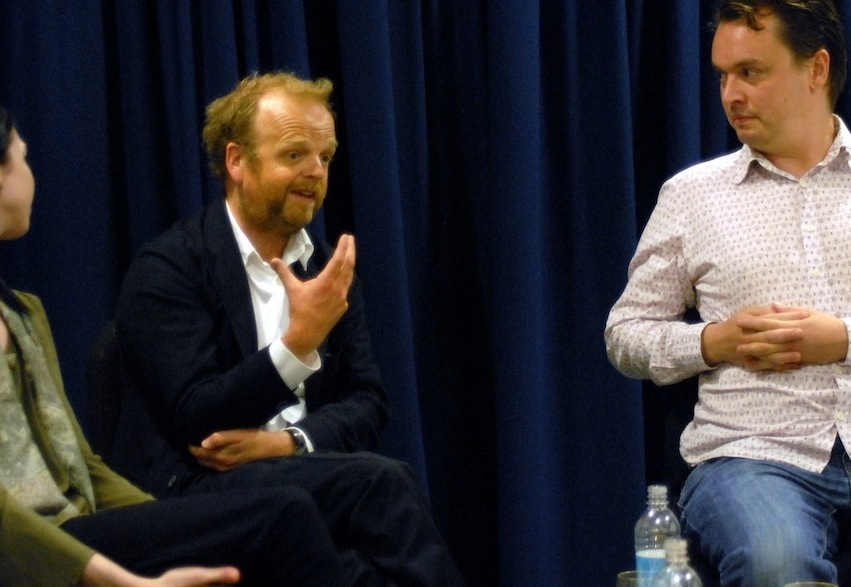 TOBY JONES (pictured left, with Joe Muggs): I can’t deny the influence of my father, Freddie Jones, because I grew up with him. But the key influence on my career, and it's still ongoing, is the person who taught me, Jacques Lecoq, partly because he expanded my understanding of what performance might be. He never limited it to a single way of performing. There are different levels of engagement with subject matter and place. He was so alert to the variations and so interested in trying to analyse how these affect us physically and mentally. I’m forever grateful for going there, it was the best place I could have gone to.
TOBY JONES (pictured left, with Joe Muggs): I can’t deny the influence of my father, Freddie Jones, because I grew up with him. But the key influence on my career, and it's still ongoing, is the person who taught me, Jacques Lecoq, partly because he expanded my understanding of what performance might be. He never limited it to a single way of performing. There are different levels of engagement with subject matter and place. He was so alert to the variations and so interested in trying to analyse how these affect us physically and mentally. I’m forever grateful for going there, it was the best place I could have gone to.
JOE: So it’s not about tricks.
TOBY: Tricks are the enemy. You acquire technique, you acquire short cuts, but the job of your teacher is to inspire you with ideals that will sustain you much longer than a trick. There are things we depend on professionally. So, no, not one specific thing - it was a vision of the vast potential. He’d be interested in this arrangement, this small room, with the camera there and how the audience is arranged. We’d be encouraged to think about the way this room operates, how much one's moving is compromised by the camera and other people, the pitch of the voice, is the way I’m moving compromised by the camera or the people near me, and how all this affects my relationship with what I’m saying, or showing. I work a lot in film at the moment, by chance, but the understanding of movement is very broad - hands, body, arms, legs, even breath itself is a movement, and so is the movement of a camera.
BRIDGETT: I came from a ballet family, my mom and my two aunts were dancers, and my sister danced and my cousins, so it was always in our blood. But something about being in the studio when I was seven years old and hearing the music, I felt, instantly, this is where I felt most at home. I never felt that comfortable anywhere else. I knew that early on. Other kids would go out and play, but I was always focused on this one thing. That’s the beginning of the inspiration. Later you learn from different people, and I came across a woman named Evelyn Hart, a Canadian dancer with the Royal Winnipeg Ballet, and then a lightbulb went off.
Everything she said I felt already inside, but she helped me find it. The way that a leg can speak, what that movement can say. She’s very musical, so hearing music in a different way and how that can communicate something else. They are in a way tricks, but it’s only to further what you are able to get across to the audience. The technique was there in the rough, but watching her body placement was revealing. It’s set up in a way that allows your joints to move very freely, and I hadn’t understood that until I watched her. I’m still working on it, that placement and having the idea in my head all the time that this is my base. This is something I can always return to to express more and more.
MAHAN: If we’re continuing this theme of family… I have realised my parents are deeply dramatic people. [Laughter] I think nothing teaches better musical control - I remember my teacher showing me that lungeing at the instrument wasn’t control; standing back was control. I suddenly thought of my mother, who didn’t have to yell or anything, she would just give me this look - and control me. It was something my father could never do. [Laughter] Now I see how maybe I have internalised that.
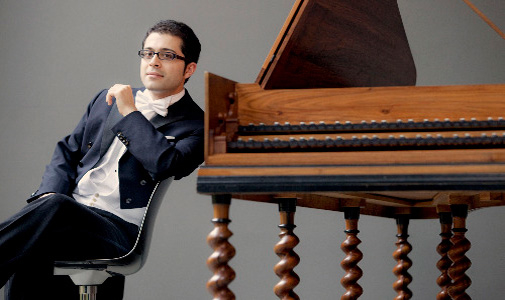 But I think probably what I'd cite would not come from in classical music. When I was at university, I had two experiences that were formative, in hindsight. In San Francisco I went to see the Peking Opera perform. I didn’t understand anything but it made me think about a book I was reading by the harpsichordist Ralph Kirkpatrick, who said, "My ideal performance was one in which I have no need to resort to babytalk," ie, that an audience, even if it doesn’t understand the music of Bach, can hear its integrity. And I thought watching this Peking performance, I didn’t understand a word but I understood its great integrity, its instincts. I felt this had significance. (Mahan Esfahani pictured right by Marco Borggreve.)
But I think probably what I'd cite would not come from in classical music. When I was at university, I had two experiences that were formative, in hindsight. In San Francisco I went to see the Peking Opera perform. I didn’t understand anything but it made me think about a book I was reading by the harpsichordist Ralph Kirkpatrick, who said, "My ideal performance was one in which I have no need to resort to babytalk," ie, that an audience, even if it doesn’t understand the music of Bach, can hear its integrity. And I thought watching this Peking performance, I didn’t understand a word but I understood its great integrity, its instincts. I felt this had significance. (Mahan Esfahani pictured right by Marco Borggreve.)
I also went to see Edward Saïd talk in one of his last speeches before he passed away, and it was the first time I’d seen someone take objective material - seemingly objective material - and simply through layers of tone and delivery and timing be able to give it several dimensions. What was texturally correct may have been objective, but the performance was what transformed this. Seeing him was something I’ll never forget.
JOE: That’s a fascinating range between you - going from a very technical inspiration with you, Bridgett, the layout of the body, to that very abstract, instinctual inspiration that you’re bringing to the harpsichord. Mara, what about you?
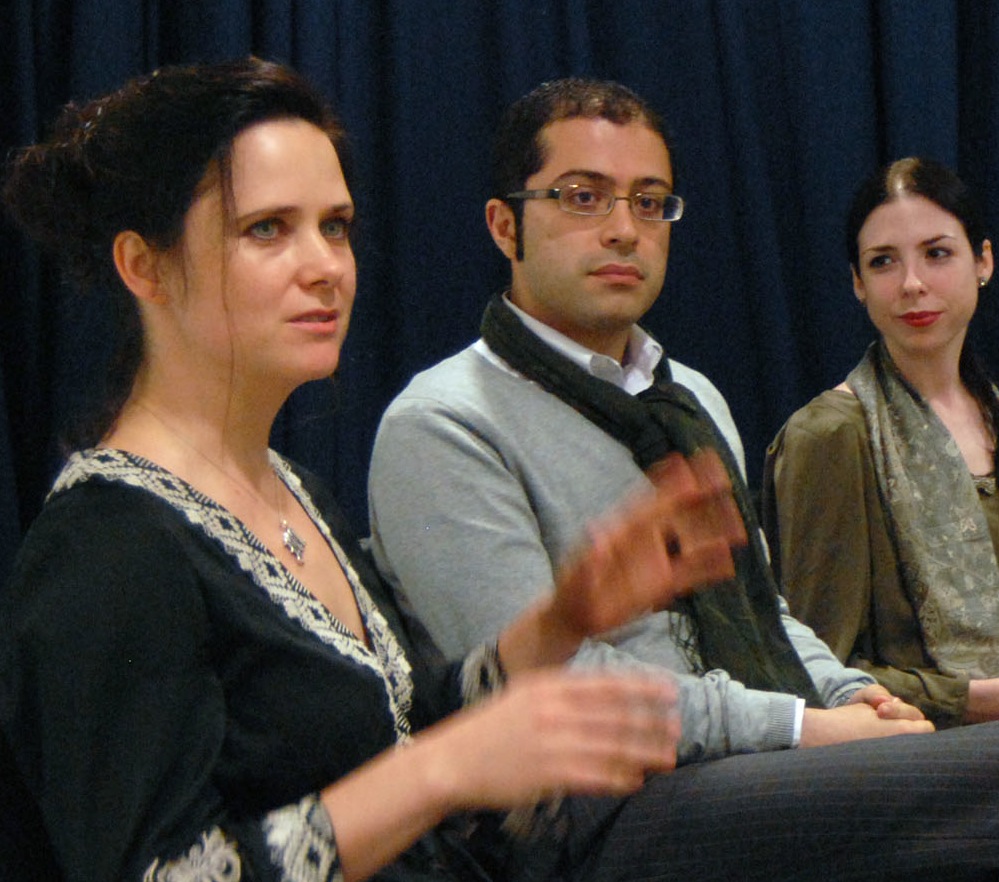 MARA: I feel inspired daily by everybody and everything, by musicians, humans, babies, dogs. Constantly totally being inspired in little ways. But I’ve been lucky enough to see incredible musical performances in all genres of music. One gig in particular always remains fresh to me - I always think it must have been the best I ever saw. An amazing singer, who died about a year ago - Lhasa de Sela - an extraordinary Canadian-Mexican singer.
MARA: I feel inspired daily by everybody and everything, by musicians, humans, babies, dogs. Constantly totally being inspired in little ways. But I’ve been lucky enough to see incredible musical performances in all genres of music. One gig in particular always remains fresh to me - I always think it must have been the best I ever saw. An amazing singer, who died about a year ago - Lhasa de Sela - an extraordinary Canadian-Mexican singer.
I saw her at the Islington Academy, a grungy little indie venue. I loved her record anyway, but I wasn’t expecting to be quite so mesmerised. It wasn’t just the quality of her singing, which was impeccable, soulful, musical - it was how she presented music. She was so composed, so dignified, and the way she spoke between songs was just as magical as when she was singing. She was storytelling, she was weaving together this wonderful picture. I thought that’s something to aim for, that’s my dream.
It also helped with one of my biggest challenges, which is just performing the music I write, because it’s very different in different presentations. I’ve got the Royal Philharmonic Orchestra playing on my album, but when I’m doing a live show I have two musicians - so how do you translate that? And my music is quite intricate and complicatedly arranged. But Lhasa had only two or three musicians, but the way she arranged it - a cellist making incredible electronic sounds, and it was so inventive. So yeah, I floated away!
JOE: The interesting moment is when the performance becomes the performance - when it moves up from preparation to the moment on the stage. What is the difference between the work, rehearsing, singing for yourself - and the performance when you step on stage or in front of the camera?
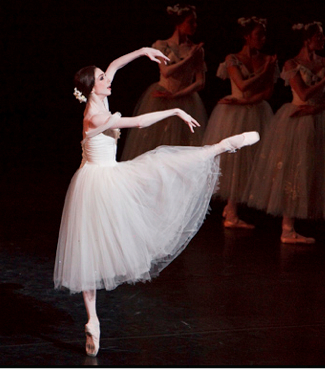 BRIDGETT: A lot of it is the adrenalin of the show. You can rehearse something as much as you want but there’s nothing like being on stage.
BRIDGETT: A lot of it is the adrenalin of the show. You can rehearse something as much as you want but there’s nothing like being on stage.
JOE: The magic is chemical!
BRIDGETT: Yeah, it might be! I always think the best part of the learning process as an artist is when I’m actually performing on stage, which is when I feel most clear, and the least worried. Everything can sink then a little deeper, what happened, what to think about another time. (Bridgett Zehr pictured right as Giselle by Eduardo Patino)
MARA: For me, because my music fits so many genres and I play so many venues - I mean, I was at the Royal Opera House last week, then a Belgian techno festival at three in the morning… It’s been great training, but I’d love solely to play in seated theatres where people are listening, rather than talking through, which they tend to at festivals. Most of my performing life it’s been me walking on stage thinking I have no idea what they’re expecting. And I’ve had to adjust my performance according to whether people are talking - or you suddenly feel you’ll need to change the songs you were going to sing, or make some jokes, or not to talk at all.
MAHAN: I think the sanguine meeting the phlegmatic, the human factor and the correct textual, is when the performance actually happens. To be frank, as a harpsichordist the idea of "performance" is hit and miss, because the harpsichord is often played but rarely "performed". Public expositions of the harpsichord are often such acts of penance [laughter] that there is no performance. When people come and judge it’s often about whether it was correct or the trill was done right. But how do we judge the "performance"? We can judge a piano performance, we can judge an acting performance. There is almost no benchmark for performance of the harpsichord. There is almost, I dare say - and I think I may get into trouble for saying this - no performing of it.
So for me, the performance is when I say, here is the objective material - to which we are all privy, for which we can all buy the score - and here is my sanguine self entering this, having a conversation with this. And I think the performance will then be something that never happens with the harpsichord: "Now that I’ve given you this performance, do you agree? Do you disagree? How do you react?" So often the harpsichord is played and there is no reaction, there’s no black, there’s no white, there’s no "Yes!" or "No!" I want to play the harpsichord and someone would come up to me afterwards and say, you know, "To hell with you." [Laughter] That would be a performance. It’s the only way you can say to people, "Look, this is a real instrument. It’s not some sort of duty that you endure and then you can go home and listen to the piano." [Laughter] It’s really an act of proof.
JOE: Do you feel the conversation with the audience going on in the hall? Do you feel a hush descending at emotional moments?
MAHAN: I can feel them reacting, I hope. I think silence is irrelevant. Silence can be part of the conversation.
JOE: Toby, sometimes you’re not performing to an audience - you’re doing it to the camera.
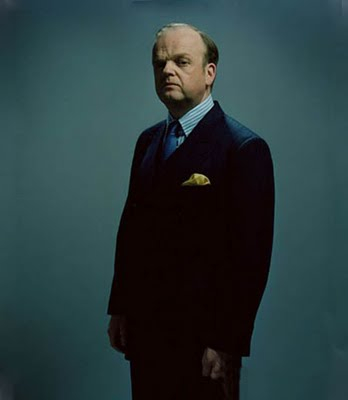 TOBY: Well, even with filming, you know the audience is beyond there, it’s an imagined audience. And the director is also watching what you might have meant when you touched your forehead in this way. He’s asking you, "When you did that, is this what you meant to signify?" For instance, Tinker, Tailor, Soldier, Spy was about very precision-directing. The director [Tomas Alfredson] relaying back to you what he sees in the camera and what he connotes by what he’s seen. He tells you, "This is what I saw." Or, "I need this to happen, is there a way you can get it to happen?" (Toby Jones pictured right in the film as opportunist "Circus" Chief, Percy Alleline.)
TOBY: Well, even with filming, you know the audience is beyond there, it’s an imagined audience. And the director is also watching what you might have meant when you touched your forehead in this way. He’s asking you, "When you did that, is this what you meant to signify?" For instance, Tinker, Tailor, Soldier, Spy was about very precision-directing. The director [Tomas Alfredson] relaying back to you what he sees in the camera and what he connotes by what he’s seen. He tells you, "This is what I saw." Or, "I need this to happen, is there a way you can get it to happen?" (Toby Jones pictured right in the film as opportunist "Circus" Chief, Percy Alleline.)
I think a lot of the act of performance is about the way you’re thinking. Whether you’re thinking clearly or chaotically. Sometimes chaos can be very useful when you’re improvising, it can deliver you into a very useful place. At other times adrenalin management is the issue - you want adrenalin, you need adrenalin, and there’s often this terrible exhaustion just before you go on stage, a crushing exhaustion that’s the by-product of adrenalin surging in waves. But by about performance 23 or 24 of the same basic material you search for something else to replace adrenalin. And you find your brain playing tricks, you’re trying to invent new games with the material. I think when we talk about "playing", we’re talking about the relationship between performer and material - and to find the best possible game to sustain that material. I think you have to invent a game, and sustain a game.
JOE: As you describe performing in a film scene, that’s a constant stopping and starting, almost micromanagement of your features. When you’re in theatre, you just let the scene roll. So is there a director in your head there?
TOBY: I’d be lying if I said there wasn’t. If I was performing a play in a small room like this, chances are it would be a very naturalistic piece, and one would be trying to be concentrated and focused on reanimating the situation you’d rehearsed. If you’re doing something very broad, like commedia dell’arte where it’s about hitting beats, about rhythm, there you are often directing yourself, shifting your body much more in a way that works in the moment. When those forms were invented, there were no directors.
JOE: Bridgett, you talked about "placing" being a breakthrough for you. Ballet being so precise, how much can you improvise to stop a performance becoming routine?
BRIDGETT: I think that's why some dancers are very special and others are just very good technicians. People who somehow can make it fresh each time. I do keep trying to look anew at each movement, go deeper into what it means, how I feel about it. With a story-ballet like Sleeping Beauty it’s so simple that it can be hard to find images, but if you give yourself a story, if you’re constantly asking yourself those questions, you can do so much more and the audience gets much more from it too.
JOE: Is improvisation something you use, Mahan?
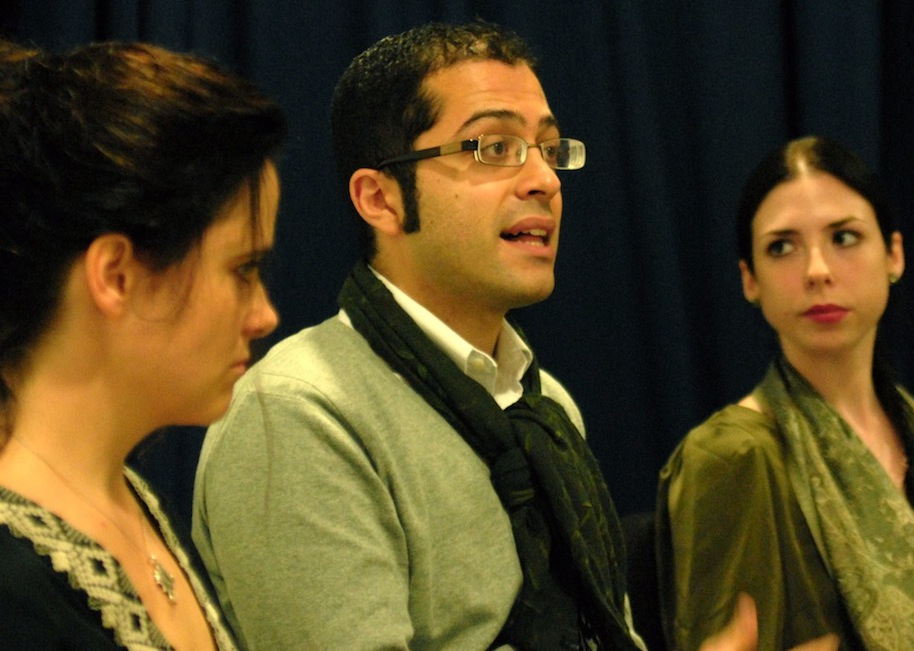 MAHAN (pictured left in the debate): For a musical thinker of the Baroque and Renaissance periods, improvisation and composition and performance were a single discipline. Bach would have taught all these things simultaneously. The division doesn’t work there. I like what Toby was saying about having to react to immediacies in a specific performance. In some sorts of music there’s no doubt that happens. Improvisation isn’t just about making up notes on the spot: it’s about varying the musical material, the conversation with the inner logic of the piece.
MAHAN (pictured left in the debate): For a musical thinker of the Baroque and Renaissance periods, improvisation and composition and performance were a single discipline. Bach would have taught all these things simultaneously. The division doesn’t work there. I like what Toby was saying about having to react to immediacies in a specific performance. In some sorts of music there’s no doubt that happens. Improvisation isn’t just about making up notes on the spot: it’s about varying the musical material, the conversation with the inner logic of the piece.
QUESTION FROM THE FLOOR: Sports people talk about going into “the zone” and say this is where they get the best performance. What comments do you have to that? And conversely, what makes a bad performance?
MARA: I was thinking how curious it is to me that my own experience differs so wildly with other people’s reactions when I’ve been performing. The number of times I’ve performed and thought how brilliant I was, and then a close friend has said, "Mara, you were a bit off…" [Laughter] Equally performances where I thought I sang like a donkey - and someone says, "Oh, that was the best I’ve ever seen you perform." I don’t understand what that is about. So I’m not very helpful on that.
BRIDGETT: I’ve had people say that to me, too. Usually on the first night it’s more exciting for me to perform because it’s so fresh and new and I’m discovering things all the time. And then the second night it feels less exciting, but it’s come across better to others… They tell me that, but I didn't get as much excitement from it.
TOBY: The challenge of repetition is an interesting area. Stanislavsky theorises about the nature of repeated performance, and I think the sporting analysis is very useful. One of the best books I read was on the art of tennis, which talked about how tennis coaches now make players react point by point, as if nothing has happened before that point. To not tell the story of the game as it appears to be going, to be inventing the point each time. I found this incredibly useful as a way of making people think about performance. I’m totally mystified, as you are, by “good” and “bad” nights. I think that’s something to do with the chemistry in the room. I sometimes think one’s perception must be something to do with fatigue, my own sense of who I am at that point, what I’ve just been through, and the sense of chasing a moment that’s coming up, rather than being there here now.
BRIDGETT: The feeling of being in complete control of yourself, that nothing can go wrong - this is an amazing feeling.
MAHAN: In music it’s interesting to gauge performance through contemporary music. Since I’ve been in this country I’ve played a lot of contemporary music and it’s interesting to see how new music is presented, I think. It’s a cliché to say so, but finding a balance is essential. You will have some performances in who the prevailing attitude is "I don’t care if you listen, I don’t care if you like it"… and the other end of the spectrum the performer or composer is being supplicant, saying, "Please, like this - it’s really not that bad." I think both of those will be a poor performance, but I couldn’t tell you the combination that makes a “good” performance. You can only redefine it each time you see a failure.
JOE: Is there such a thing as too much rehearsal?
TOBY: Undoubtedly! Within the span of a filming schedule there’ll be certain moments. It’s a very curious thing, how to prepare for a film. You have to have a strong sense of the overall story and what is required of your character. Often if you’re not the lead character, and it’s a good film and a good script, your job will be to bring colour into the film, to add a colour to the journey the hero is making. It may not require a great deal of rehearsal, however. It might be a benefit to see the kind of location or room the director is placing you in so as to work out how that scene would work best. But if you’re playing the lead character you won’t want to release all your guns in the first emotional scene - it’s a strategic thing, and rehearsal will help you modulate your performance.
I think plays can be over-rehearsed, depending on the genre. Great directors know what preparation is required, for these performers, with this material.
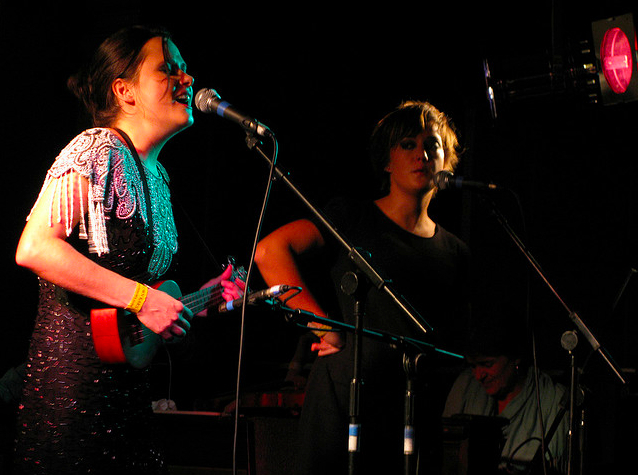 MARA: I can honestly say I have never had the luxury of being over-rehearsed! Because what I do costs money to rehearse. I have to pay for time, for the musicians, so we are often scrabbling it together. I’ve done some performances where I’ve been sat in the back of a cab on the way to the gig teaching the guitarist the chords.
MARA: I can honestly say I have never had the luxury of being over-rehearsed! Because what I do costs money to rehearse. I have to pay for time, for the musicians, so we are often scrabbling it together. I’ve done some performances where I’ve been sat in the back of a cab on the way to the gig teaching the guitarist the chords.
JOE: Good performances?
MARA: Well, yeah! I think that can lend it a bit of energy and excitement! (Mara pictured right performing in October 2010, courtesy Brother G/flickr)
JOE: What about the Baroque or classical field, Mahan? Does more rehearsal of a familiar piece give you more of a feeling for it?
MAHAN: I think it depends on the composer. I was thinking on the way here that performance is such an act of belief, such a credo, that one reason why musicians say it’s so difficult to perform bad music, is that you have to act like you like this piece.
So for example, Bach, in a strange way, though it is so difficult to play, and you can spend your entire life feeling you don’t understand him, is easier to perform than Handel. [Laughter] Because Bach rewards us with examining his music, every hour, every day, for our entire life. He’s always giving that to us. but with Handel, say, a bit of distance is good.
JOE: I should point out that you’re sitting next to someone who just released a Handel song as a single…
MARA: That’s not quite right but I have made a weird arrangement of “Art Thou Troubled?”
MAHAN: Well, that’s a nice piece, it’s all right! [Laughter] But with this composer you have also to realise that in his performance context, a lot was given to the whim of the moment; he didn’t write everything down. Bach was different. So it repays to know what that person’s attitude to performance was.
MARA: Returning to the rehearsal point. I think there have been occasions when I rehearsed - they were subsidised occasions. With subsidy, with patronage, rehearsal is possible. Interesting! A whole other debate!
QUESTION FROM THE FLOOR: Considering where we are right now, is criticism useful to you, or to be ignored?
TOBY: You mean from “critics” or from friends or colleagues? [Pause... laughter]
MARA: The brutal truth is that it makes a difference. Certainly from my perspective, the fact that this album of mine is getting really good reviews means that I have a stack of good quotes to promote myself. It actually really really matters, certainly in music. The reviews are an essential fibre of the whole process.
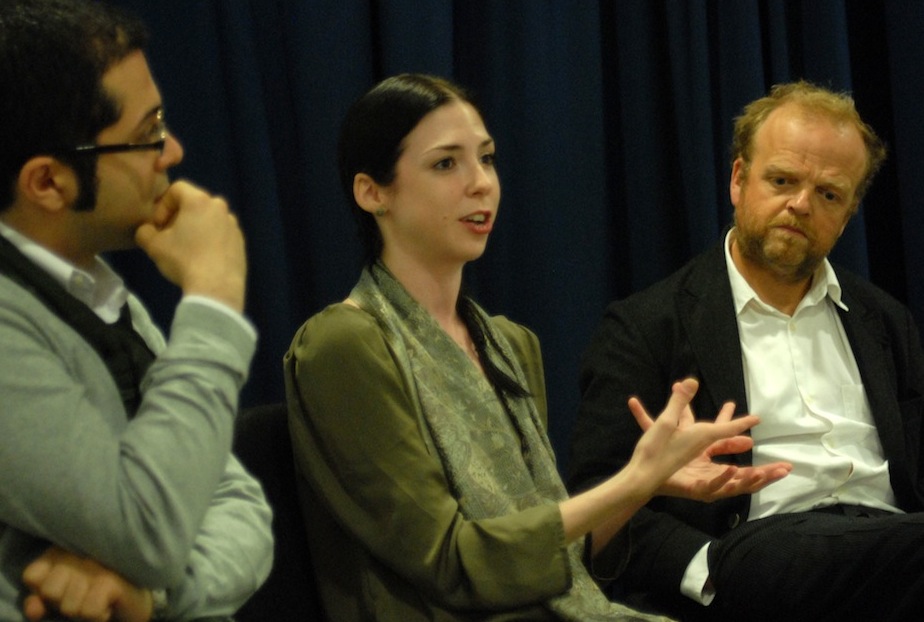 BRIDGETT (pictured left in the debate): I think before I was promoted to a principal dancer, everybody liked me! And then once I was a principal I got criticised. The higher you go, the more they criticise. It’s hard to deal with that.
BRIDGETT (pictured left in the debate): I think before I was promoted to a principal dancer, everybody liked me! And then once I was a principal I got criticised. The higher you go, the more they criticise. It’s hard to deal with that.
You try to find something helpful in what they say… I’m a sensitive person, so it’s hard not to let it matter too much. You see the review of opening night and you’ve got to perform it again, and you try not to let that criticism distract you from your own idea, and what you’re trying to do. For instance, I did Carmen, and somebody called me bloodless. And I felt it was so hurtful, because I felt I really was doing it well. [Laughter] But then I realised, it’s one person’s opinion, and many others had complimented me. So I think I decided that I must try to learn from it, if anything. Perhaps to do something different to project across the lights more. Or not. Pick and choose what you can learn from.
MAHAN: Critics are a useful barometer for seeing how things change, how attitudes change, how the discourse is changing. When I think, it took quite a bit of effort to put myself out there, for a critic to finally engage at a level other than “they were nice trills”. And I finally could think, “Wow, this shows people’s view about the harpsichord is changing.” I feel there are many reviewers who are afraid, they don’t know how to respond. So when you see someone starting to understand your language and trying to engage with it, that’s very interesting, and it performs a function in any musical society. There are musical societies where you have good performers, but not good critics. Or good critics but not many performers. Or you might have open audiences, but not good performers. So I think London is very blessed, in having all those elements.
JOE: I work with a lot of young musicians in the scene, who are now using me as a “translator”, in a sense, of how they come over to the outside world. Are you happy to be criticised as a performer, rather than as a musician - I mean in terms of performing style? Have you found people describing an emotion in your performance that you didn’t realise you were conveying?
BRIDGETT: I think the greatest compliment is when someone tells you they cried. They really felt something deeply.
MARA: I think I feel something of a failure if I don’t make people cry. It’s my goal - to make people miserable!
JOE: I think on that note, we’ve found the essence of performance! So I hope now you’ll come and join our party. Thank you all for coming.
- Bridgett Zehr dances with English National Ballet on their autumn tour of Strictly Gershwin, 6 October-19 November, visiting New Theatre, Oxford, the Manchester Palace, Southampton's Mayflower Theatre, the Wales Millennium Centre, Cardiff, the Liverpool Empire and the Milton Keynes Theatre
- Mahan Esfahani gives his next UK recitals in October in York, Oxford and Perth
- Toby Jones's new film, Tinker, Tailor, Soldier, Spy, opens in the UK on Friday - see the official website and trailer
- Find Mara Carlyle's new album Floreat on Amazon
- The Kings Place Festival continues today at Kings Place, York Way, London N1, with performances by pianist William Howard, Odissi and Bharatanatyam classical dance, the London Bulgarian Choir, the National Youth Jazz Collective and the Brodsky Quartet playing Britten among its attractions
Explore topics
Share this article
The future of Arts Journalism
You can stop theartsdesk.com closing!
We urgently need financing to survive. Our fundraising drive has thus far raised £49,000 but we need to reach £100,000 or we will be forced to close. Please contribute here: https://gofund.me/c3f6033d
And if you can forward this information to anyone who might assist, we’d be grateful.

Subscribe to theartsdesk.com
Thank you for continuing to read our work on theartsdesk.com. For unlimited access to every article in its entirety, including our archive of more than 15,000 pieces, we're asking for £5 per month or £40 per year. We feel it's a very good deal, and hope you do too.
To take a subscription now simply click here.
And if you're looking for that extra gift for a friend or family member, why not treat them to a theartsdesk.com gift subscription?

Add comment